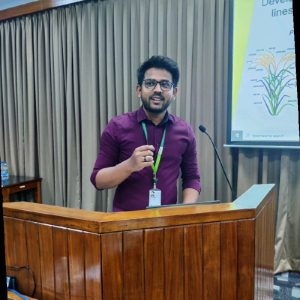
Oct. 14, 2024
2024 MUIDSI Symposium
The 14th Missouri Data Science and Informatics Symposium will be held on October 21-22, 2024. This year’s theme is “Using Artificial General Intelligence for Good.” We are excited to present exceptional keynote speakers, faculty research highlights, student presentations and posters. In addition to academic talks, we are featuring industry presentations showcasing emerging technologies in AI and quantum computing. This symposium continues a proud tradition of being organized by the MU IDSI Graduate Student Organization (GSO), which handles everything from planning to execution. For more details on the program, please visit: Symposium Program to register for the Symposium.

Nov. 3, 2023
A Novel Approach to Antigen-reactive T Cell Identification
T cells are instrumental in orchestrating cell-mediated adaptive immunity by their unique ability to recognize antigens via T cell receptors (TCRs) and initiate downstream immune responses. TCRs exhibit an astonishing degree of variability, surpassing numbers of T cells within an individual. However, only a minute fraction of T cells possesses the capacity to recognize a specific antigen, playing a pivotal role in particular diseases. The precise identification of T cell subsets with specificity to an antigen within the vast T cell repertoire holds immense promise for advancing research in fields ranging from infectious diseases and autoimmunity to vaccine development and…

Nov. 3, 2023
Iterative Prompt Refinement for Mining Gene Interactions from ChatGPT
In recent years, the prowess of large language models (LLMs) like ChatGPT by OpenAI has garnered immense attention, not just for their raw computational abilities, but also for their potential as surrogate knowledge graphs. Trained on a plethora of data sources, ranging from peer-reviewed research articles to the vast swathes of the web, these models proffer tantalizing prospects for tasks that have traditionally posed immense challenges, such as biological pathway extraction. Pathways, which serve as schematic representations of inter-molecular interactions, are pivotal for understanding intricate biological processes, elucidating disease mechanisms, and spearheading drug development. However, as promising as LLMs might…

Oct. 10, 2023
Identifying Genetic Variants Associated With Sex Specific Protective Effects In Autism Spectrum Disorder Using Adaptive Complexity Deep Neural Networks

Sep. 21, 2023
Evaluating Benchmark Models with Multi-Omics Approaches for Long-Term Survival (LTS) Prediction Across 23 Cancer Studies
Cancer is a major cause of global mortality, necessitating accurate long-term survival (LTS) predictions for patients to optimize treatment strategies and improve prognosis. The advent of high-throughput technologies has facilitated the study of biological systems through multiple omics data, including genomics, transcriptomics, proteomics and other omics. Consequently, multi-omics approaches have emerged as promising tools for enhancing cancer biology understanding and enabling more precise LTS predictions. This study aims to assess the performance of various benchmark models (including our own in-house developed G2PDeep multiCNN model and other methods) in multi-omics approaches for LTS prediction across 23 distinct cancer studies. We…

Sep. 21, 2023
Prototyping a Web-based Interface of Sensor Technologies for Remote Care Coordination and Self-management
The widespread adoption of consumer sensor technologies, including wearable and in-home sensors, present an opportunity for ambient monitoring of activities of daily living for health and behavioral intervention. Health care professionals (i.e., care coordinators trained as nurses, occupational therapists, and social workers) in the Age-friendly Sustainable Smart and Equitable Technologies for Access for Aging in Place (ASSETs for AIP) project monitor client behaviors using passive environmental and wearable sensors with several disparate tools to review and interpret sensor data. Together with care coordinators, informatics researchers are co-designing an interactive user-friendly and web-based interface for understanding patterns of behavior and identifying…

Sep. 20, 2023
Relationships Between Mortality and Respiratory Health, Medication Usage, Water Disappearance, and Climatic Conditions in Commercial Weaning-To-Finishing Pigs
Mortality in pigs is of paramount economic importance to United States pig producers. According to data compiled by MetaFarms SMS and Pork Checkoff in 2022, 21.2% of pigs die before reaching slaughter, and this statistic has increased, in general, over the last 5 years. Although only 6.8% of these losses are attributed to pigs in the wean-to-finish production phase, these pigs are more valuable due to added daily feed expenditure. Thus, reduction of weaning-to-finishing pig mortality is necessary to improve sustainability and profitability of current pig production operations. The objective of the current study was to identify health and climatic variables that are…

Sep. 20, 2023
Enhancing Single Cell RNA-seq Analysis and Annotation for Understanding the Impact of CD137 Agonist on Cancer Immunoprevention through Advanced Informatics Algorithms
SA-4-1BBL, a novel CD137 receptor agonist, has been generated by our group and selected as a promising candidate for preventing cancer progression in research. The SA-4-1BBL demonstrates notable immunoprevention efficacy in diverse tumor models when utilized as a treatment in research subjects. Nevertheless, this efficacy stands in contrast to 3H3, another CD137-targeting antibody, which appears failing in generating cancer prevention outcomes in research subjects. The differing results obtained with SA-4-1BBL and 3H3 have raised questions about the reasons behind this disparity even though SA-4-1BBL and 3H3 target the same CD137 receptor. To uncover the underlying differences between SA-4-1BBL, 3H3, and…

Sep. 15, 2023
Relationships between mortality and respiratory health, medication usage, water disappearance, and climatic conditions in commercial weaning-to-finishing pigs
Mortality in pigs is of paramount economic importance to United States pig producers. According to data compiled by MetaFarms SMS and Pork Checkoff in 2022, 21.2% of pigs die before reaching slaughter, and this statistic has increased, in general, over the last 5 years. Although only 6.8% of these losses are attributed to pigs in the wean-to-finish production phase, these pigs are more valuable due to added daily feed expenditure. Thus, reduction of weaning-to-finishing pig mortality is necessary to improve sustainability and profitability of current pig production operations. The objective of the current study was to identify health and climatic variables that…